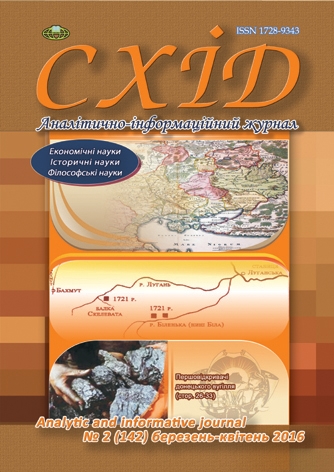Mykola's Shlemkevich philosophical system and its relevance to Ukrainians outlook formation
DOI:
https://doi.org/10.21847/1728-9343.2016.2(142).62665Keywords:
Mykola Shlemkevich, outlook, creative forces, synthesis, artistic heritageAbstract
The philosophical inheritance of Mykola Shlemkevich remains small worked out for today. In part because his works have been scattered, published in various publications under pseudonyms, in part, because of the fact that he has long been is attached the label "nationalist" and sometimes "nationalist fascist. Mykola`s Shlemkevich works fold the philosophical system and it is an obvious fact. They are incorporated by structural and methodological community. It is important to consider the Shlemkevych`s philosophical system it in its fullness and integrity, as in his writings thinker pointed not only to the problems faced by Ukrainian, but also on ways to overcome them. Mykola Shlemkevich always marked practical character of philosophy, he considered that philosophy must be added to practice. He also mentioned this in his work "The essence of philosophy", for which in 1926 got in the Viennese university rank of Ph.D. Slemkevich defines philosophy as the inner essence symbolic systems of science, religion, art, culture. He calls philosophy "the queen of sciences."
"Lost Ukrainian man" published in New York in 1954 is a perfect example of deep understanding of the social, political, cultural and philosophical problems faced man of modern times. Thinker notes that everyone naturally seeks happiness, but Ukrainians believe that happiness is oblivion. Shlemkevich emphasizes that it is not true.He notes that there is no oblivion for Ukrainians. He sees solution in leadingout of all complexes on a surface. Solving these problems is the responsibility of the elite, because that philosophers, politicians and artists should be support for people.
Also a philosopher investigates the question of the political system that would answer the necessities of Ukrainians most. In his "Ukrainian synthesis or Ukrainian civil war" published in 1946 philosopher considers the title of "creative forces" (polity). They are: Ukrainian autocracy - the monarchy, Ukrainian democracy - democracy and the Ukrainian leadership. Contrary to the creative forces are the forces of anarchy. Creative forces can not overcome force of anarchy because operate separately. Also creative forces argue among themselves. One`s of creative forces victory is undesirable because will result in totalitarianism, and it unusual to Ukrainians. Thus a thinker talks about a necessity to find a consensus, because only together they will be able to bringUkraineover to prosperity.
Downloads
References
Burachok N. (2013), Scientific heritage Shlemkevych Mykola, Visnyk Prykarpatskoho natsionalnoho universytetu im. V. Stefanyka, Vol. 23 «Historical science», p. 441-446, available at: http://www.pu.if.ua/depart/SlavsHistory/resource/file/Buraczok%20N..doc (ukr).
Kulchytsky Olexander (1981), Introduction to the essence of philosophy issues, in: Shlemkevych Mykola. The essence of philosophy, Zapysky NTSH, Vol. 191, Paris, New York, Munich, 255 p. (ukr).
Shlemkevych M. (1981), The essence of philosophy, Zapysky NTSh, Vol. 191, Paris, New York, Munich, 255 p., available at: http://diasporiana.org.ua/wp-content/uploads/books/4212/file.pdf (ukr).
Shlemkevych M. (1992), Lost Ukrainian man, Phoenix Publisher, Kyiv, 158 p. (ukr).
Hryniv O. (2015), History of Ukrainian philosophy, W.p., Lviv, 290 p., available at: http://www.nru.org.ua/blogs/bloh-oleha-hryniva/1419-istoriya-ukrayinskoyi-filosofiyi (ukr).
Artiukh V. (2009), Some historiosophical philosophical ideas in journalism Mykola Shlemkevych: attempt existential interpretation, Filolohichni traktaty, № 3-4, Vol. 1, p. 8 (ukr).
Shlemkevych M. (1946), Synthesis Ukrainian or Ukrainian civil war, Lviv, 63 p., available at: http://diasporiana.org.ua/ideologiya/208-shlemkevich-m-ukrayinska-sinteza-chi-gromadyanska-viyna (ukr).
Ponomariov V. (2012), Synthesis Philosopher Nicholas Shlemkevych, Tyzhden, 26 Jun, p. 10, available at: http://tyzhden.ua/History/53826 (ukr).
Downloads
Published
How to Cite
Issue
Section
License
Copyright (c) 2016 Mariia Grynenko

This work is licensed under a Creative Commons Attribution-NonCommercial-NoDerivatives 4.0 International License.
1. Authors bear responsibility for the accuracy of facts, quotations, numbers and names used.
2. Manuscripts are not sent back.
3. The publisher does not always agree with the authors' opinion.
4. The authors reserve the right to authorship of the work and pass the first publication right of this work to the journal under the terms of a Creative Commons Attribution-NonCommercial-NoDerivatives 4.0 International License. This license allows others to distribute (copy) the published work for non-commercial purposes, provided there is mandatory attribution to its authors and a link to the first publication in our journal.
5. The authors have the right to conclude separate supplement agreements that relate to non-exclusive work distribution in the form in which it has been published by the journal (for example, to upload the work to the online storage of the journal or publish it as part of a monograph), provided that the reference to the first publication of the work in this journal is included.

